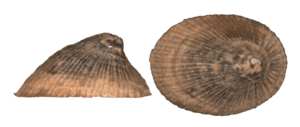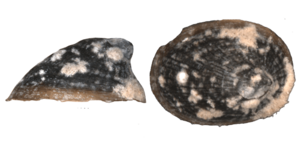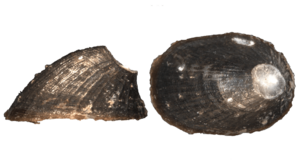Wicker ancylid facts for kids
Quick facts for kids Wicker ancylid |
|
|---|---|
 |
|
| A 100-year-old museum shell of the wicker ancylid from Tallaseehatchee Creek in Alabama | |
| Conservation status | |
| Scientific classification | |
| Synonyms | |
|
The wicker ancylid (scientific name: Rhodacmea filosa) is a very small, air-breathing freshwater snail. It's a type of limpet, which means its shell is shaped like a little cap, not a spiral. This tiny creature belongs to a group of snails called gastropods and is part of the Planorbidae family.
Rhodacmea filosa is the main example (or type species) for its group, called Rhodacmea.
Where Does It Live?
This special snail is found only in the United States. For a while, people thought it had completely disappeared. But then, in 2011, it was found again!
It used to live in rivers and streams that flow into the Mobile River in Alabama. Its first known home (called its type locality) was the Black Warrior River, near Blount Springs, Alabama.
Scientists looked for Rhodacmea filosa for over 20 years. They searched hundreds of places in the Coosa River, Cahaba River, and Black Warrior River areas. They couldn't find any. However, it was later found living in Choccolocco Creek. This creek is a smaller stream that flows into the Coosa River.
It's amazing that this snail survived in Choccolocco Creek. This area has faced some tough challenges, including pollution from factories. But the wicker ancylid managed to keep going!
What Does It Look Like?
The wicker ancylid was first found and described in 1834. A scientist named Timothy Abbott Conrad gave it the name Ancylus filosus back then.
Conrad described it like this:
ANCYLUS FILOSUS
Shell regularly oval, rather elevated; with numerous radiating prominent lines; apex very prominent, inclined, eroded, not nearly central.
This means the wicker ancylid has a shell shaped like a tall, oval cap. It has many strong lines that stick out. These lines go from the top of the shell (called the apex) all the way to the opening (called the aperture). The apex is very noticeable and leans to one side.




